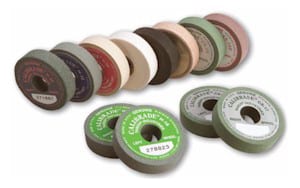Taber® Grinding Wheels are available in many levels of abrasiveness to suit a wide range of material testing applications.
The choice of abrasive media should be based upon the wear the specimen material will be subjected to in actual use.
Wool felt or rubber wheels are used to test delicate materials. Wheels of abrasives in a matrix of rubber or vitrified clay are used for other materials.
Abrading wheels for Taber® Abrasers include five general types of varying abrasive quality:
- Calibrase® — a resilient wheel composed of rubber and aluminum oxide abrasive particles;
- Calibrade® — a non-resilient wheel composed of vitrified (clay) and silicon carbide abrasive particles;
- Wool Felt — no abrasive particles;
- Plain Rubber — no abrasive particles unless used with sandpaper strips;
- Tungsten Carbide — extremely severe cutting and tearing action with helical teeth for use on resilient materials such as rubber, leather or floor covering.
Ask for Price

Taber® Calibrase® Wheels —now with ‘Easy Glide’ wheel hub
| Number | Color | Composition | Load Range (g) | Abrasive Action |
| CS10 | Green | Rubber & Abrasive Grain | 500—1000 | Mild |
| CS10F 1 | Brown | Rubber & Abrasive Grain | 250—500 | Very Mild |
| CS-T3 2 | Red | Rubber & Abrasive Grain | 500—1000 | Mild |
| CS10P | Green | Rubber & Abrasive Grain | 500—1000 | Very Mild |
| CS10W | White | Rubber & Abrasive Grain | 250—500 | Mild |
| CS17 | Dark Green | Rubber & Abrasive Grain | 500—1000 | Very Mild |
- Reface with S-11 Refacing Disc or ST-11 Stone
- Use before expiration date
- Store in original container
- Recommended storage conditions: temperature 23°C ±2°C and relative humidity 50% ±5%
1 Do not exceed 500 g load
2 Formerly CS10F Type 3
| Number | Color | Composition | Load Range (g) | Abrasive Action |
| H10 | Grey-Green | Vitrified Clay & Abrasive Grain | 500—1000 | Coarse |
| H18 | Grey-Green | Vitrified Clay & Abrasive Grain | 500—1000 | Medium Coarse |
| H22 | Green | Vitrified Clay & Abrasive Grain | 500—1000 | Very Coarse |
| H38 3 & 4 | Tan | Vitrified Clay & Abrasive Grain | 250/500/1000 | Very Fine, Hard |
- Reface with Taber® Wheel Refacer
- Store in original container
- Recommended storage conditions: temperature 23°C ±2°C and relative humidity 50% ±5%
3 Do not exceed 500 g load
4 Reface with multipoint tool
- Reface with Taber® Wheel Refacer
- Store in original container
- Recommended storage conditions: temperature 23°C ±2°C and relative humidity 50% ±5%
Do not exceed 500 g load
Reface with multipoint tool
The non-resilient Calibrade® wheels are subject to ‘clogging’ and ‘crowning’. The wheels may be refaced as often as required down to the minimum usable diameter of 44.5 mm (1.75 inch) as indicated on the wheel label.
Under conditions of typical application, any given load and wheel combination should perform a minimum of 300 test cycles on a material. If the abrasive media becomes unusable, due to wear, prior to the completion of 300 test cycles, the test may not correspond to normal wear and another media / load combination should be considered.
Taber Abrasion Tester, Taber abraser, abraser, Taber, abrasion, abrasion tester, abrasion test, Taber abrader, Taber Method, abrasion resistance, laminates, paper, cardboard, paper board, thermosetting resins, laminate floor covering, resilient floor coverings, wood and parquet flooring, flooring, elasticity, resistance to wear, melamine, particle board, rubber coated fabric, plastic coated fabric, coated fabric, abrasive wheels, rubbing, paint, varnish, Frick Taber Test, textiles, laminar flow, decorative laminates, glazed ceramic, unglazed ceramic, dimension stone, transparent plastic, rotary platform abrader, powder coatings, polymeric powder, wall coatings, organic coatings, pile retention, protective coatings, mar resistance, scratch resistance, grit feed method, copiers, printers, ink, thermal spray coatings, film, marking, bar code, aminoplastic resins, cloth, foil, anodized aluminum, scuffing, upholstery, anodic oxidation, bodycloth, snagging, bearding, fiber loss, HPL, glazing, safety glazing, 85.060.





